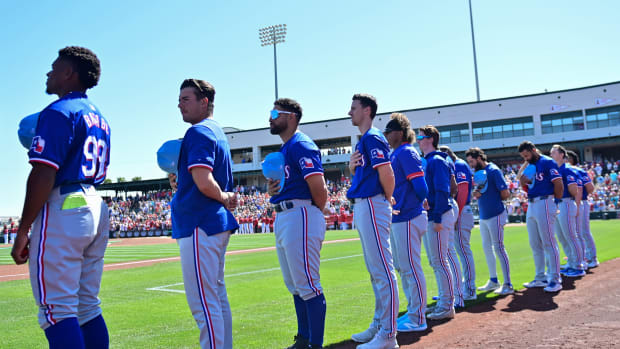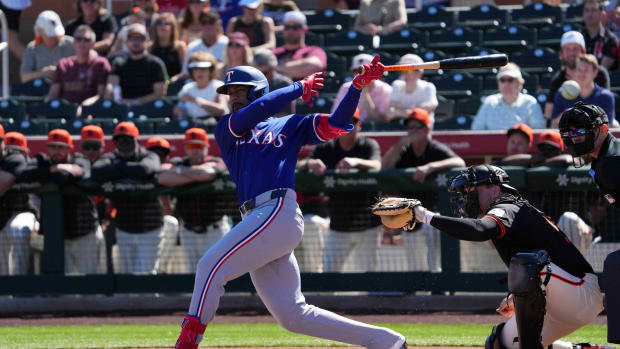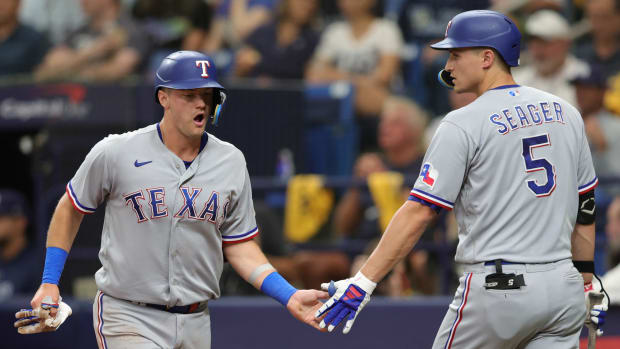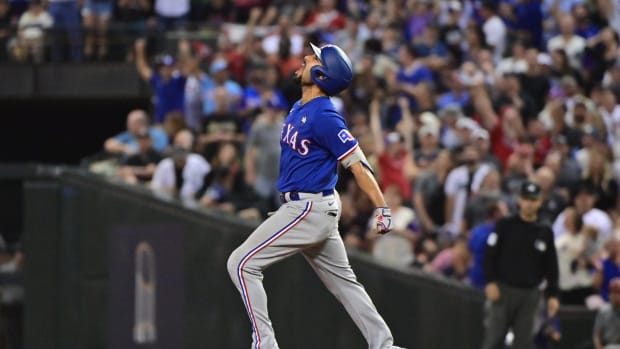Rangers GM Jon Daniels Opens Up About Racial Inequality: "Quite Frankly, We Haven't Done Enough"
The MLB Draft is less than a week away. Texas Rangers President of Baseball Operations and General Manager Jon Daniels and his staff are focusing on how to properly navigate through a unique five-round draft to improve the club's farm system.
However, that wasn't Daniels' primary focus on Thursday.
When the coronavirus pandemic shut down the baseball world, Daniels' theme centered around some things being bigger than baseball. That theme continued in a conference call with the local beat writers on Thursday.
Daniels' primary focus was on the hurt our country—specifically the African American community—is feeling in the wake of the murder of George Floyd by a Minneapolis police officer. Before reporters had the opportunity to ask questions about the upcoming MLB Draft, Daniels addressed the impact of racial injustice head on for several minutes.
"You know me, I'm not particularly one to make social statements, but it feels a little bit like we shouldn't just jump into business as usual without having at least touched on everything that's going on in society and the country," Daniels said. "It obviously affects all of us."
Daniels prefaced that he was not speaking for the Rangers, but sharing his own personal thoughts that reflected himself and his family.
"Obviously I am not an expert here, and I don't pretend to be one. But just watching everything that's going on, I share in response, probably how a lot of you feel. It's hard to see. And it stirs a lot of feelings, emotions, fear," Daniels said.
"To state the obvious, I'm not black; I can't sit here and put myself in the shoes of somebody who is, and I don't have the same response to it or fears as far as how it might affect myself or my kids personally, walking down the block. But I've just been trying to look at it from the perspective of: what can we learn? And more importantly, how can we ultimately help?"
Daniels continued to detail his own self-evaluation—of how he can improve both professionally and personally. As the club's President of Baseball Operations and General Manager, Daniels understands that his role comes with the responsibility of setting the right example.
"I've just been thinking a lot about what I need to do, to think about and ultimately improve," Daniels said. "I want to think I do right, but what sort of intrinsic biases are in my own world? I've been thinking a lot about that.
"I've got to listen more. I've got to be prepared to help in a way that others suggest is truly constructive and helpful, and I think we've got some ideas and we've started some conversations—both in my family and here at work—and I think people have brought up some really good thoughts that we need to flesh out and see how we can help. But are we going to be prepared to help when the headlines change and it's not the popular thing to do anymore?"
Daniels acknowledges that his own self-reflection is only the beginning. Further action is not only necessary, but mandatory. Action that includes communication—and sometimes uncomfortable conversations—is a part of how he and many others can properly address the issue of racial injustice.
Some of Daniels' own players publicly expressed their own perspective as African American males. Willie Calhoun recently joined Sports Illustrated's Madelyn Burke to discuss how he is using his platform to speak out against racial injustice. Both Calhoun and teammate Taylor Hearn detailed some of their day-to-day experiences with Evan Grant of the Dallas Morning News.
Uncomfortable conversations are obviously not easy to have, but Daniels is committed to having an environment where people feel open enough to have those conversations.
"If you have a culture where people feel comfortable to share and to talk, you have something of an advantage in that spot," Daniels said. "If you are starting from scratch, I think it's tougher. I feel we have a culture that encourages that, allows for that. It encourages people to have ideas about how we can improve our department."
Daniels acknowledged this is not a new issue. He called the murder of George Floyd a "flash point" in a number of other incidents that have not been properly justified. He stressed that the opportunity to tackle this issue head on now, and in the future, cannot be overlooked.
"Quite frankly, we haven't done enough about it," Daniels said. "I think the challenge is to take how we're all feeling about it and commit to not letting it slip away when the next change in seasons comes along or when the headlines change or when the spotlight shifts a little bit.
"Right now, it's not an easy topic, by any stretch, but it's easy to bring up, because it's in the forefront of our public societal discussion...I don't want this to be a PR thing, but where will we be next time when it's not easy? When it's not at the forefront? Are we prepared to—how we're all feeling right now and as passionate as we're all feeling about it—are we prepared to stand with and support people that take an unpopular stance, or do it at a time when it's not maybe as convenient for other people? Or in a way that's not as comfortable for other people? Are we prepared to feel the same way and act the same way at that time?"
Daniels’ humility can set a powerful trend not just in his organization, but throughout Major League Baseball and the sports world at large. Using his status to speak out against racial inequality can only aid in awareness and action.
“I just don't want to be in the same cycle where we're watching the same things and having the same conversations down the line, months or years down the line because we haven't done enough to address it here in the short term.”
Follow Inside The Rangers on SI on Twitter: @SITexasRangers
Like Inside The Rangers on SI on Facebook: facebook.com/SITexasRangers
Follow our Rangers insider Chris Halicke on Twitter: @ChrisHalicke




